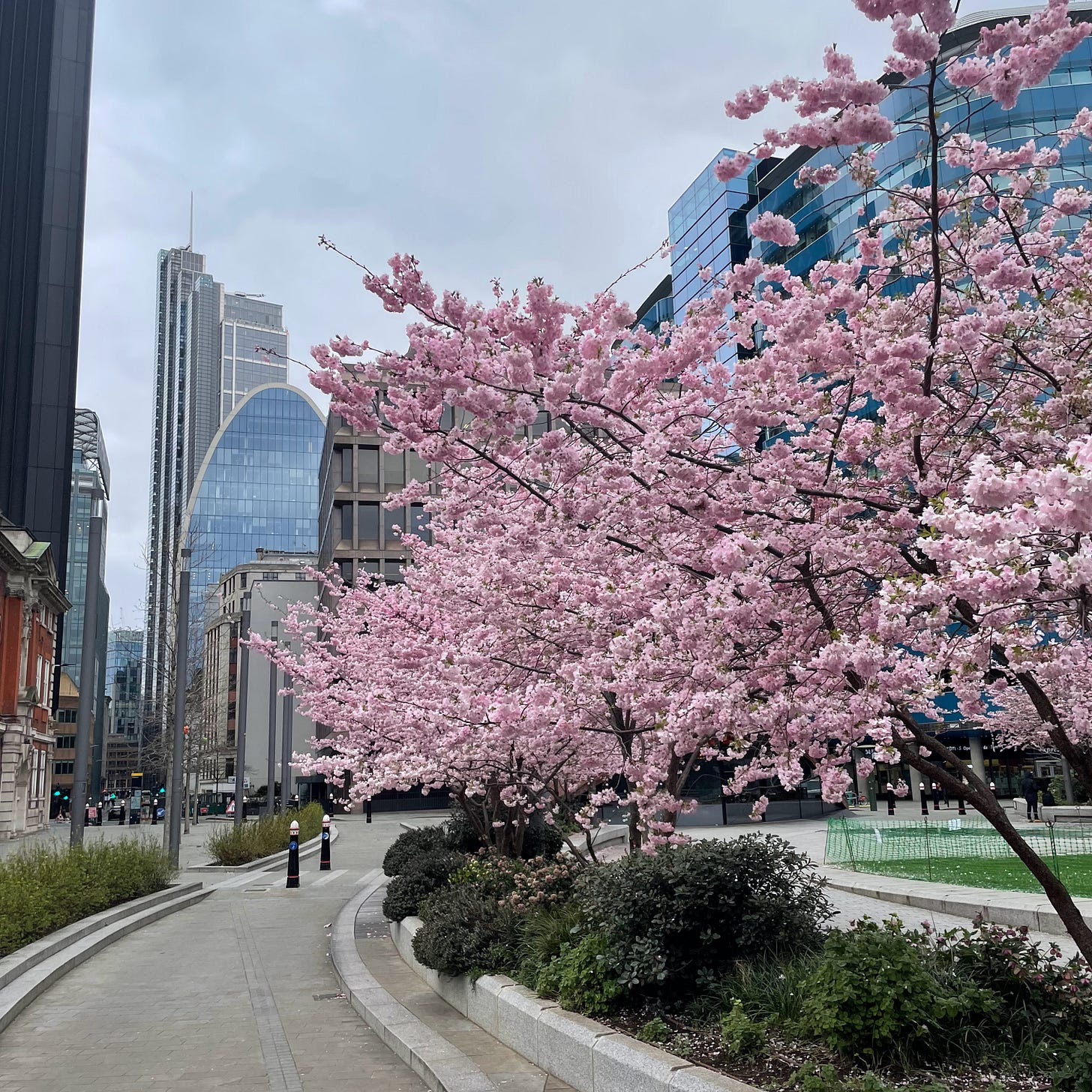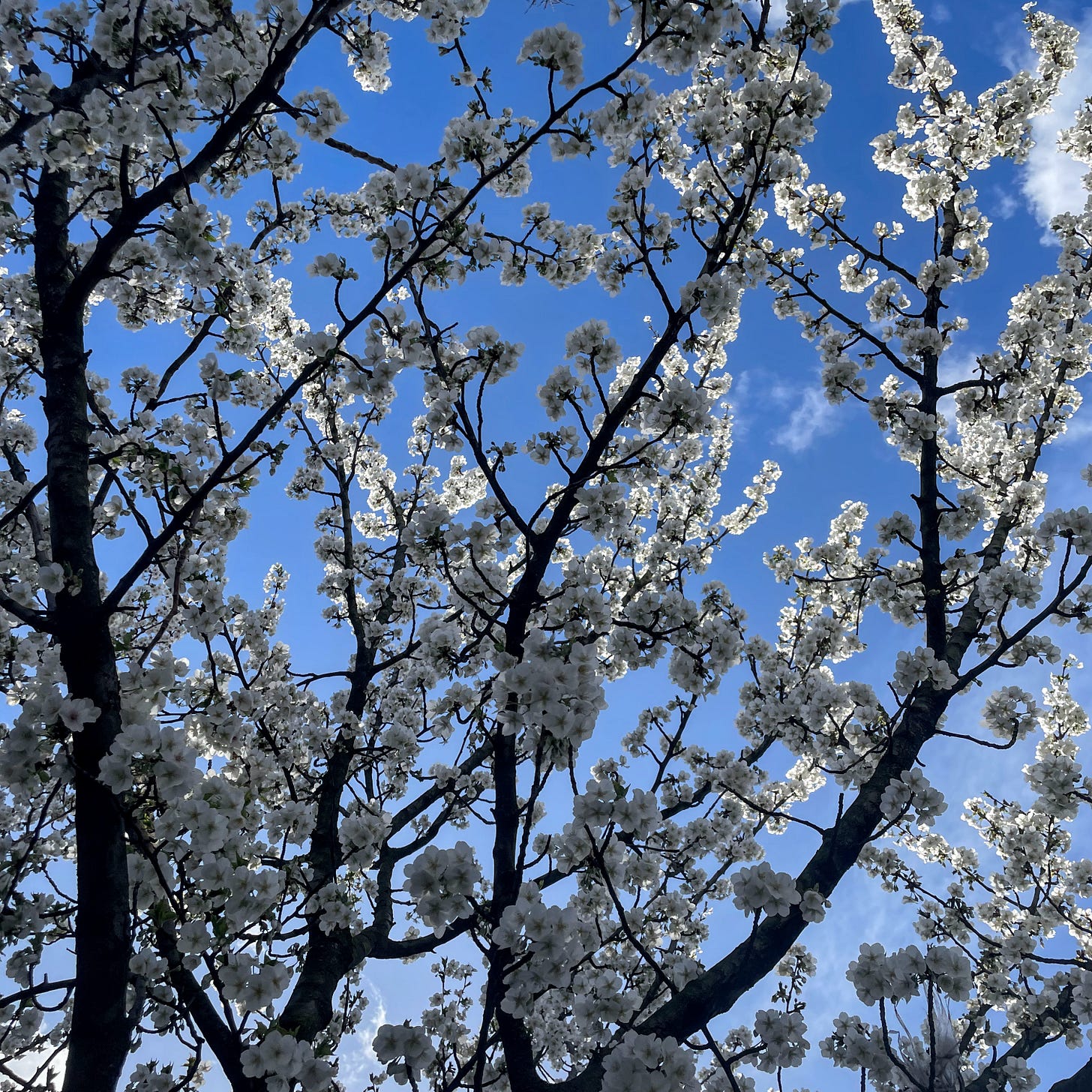Blossoming cities
How fruit trees help us thrive
It’s Wednesday. You didn’t sleep well last night, and you’re beginning to come down with something. You’re worried about energy bills, climate change, and if our new AI overlords are going to take your job. You head out to get some air, turn the corner, and for a moment - just for a moment - let the colours of spring wash over you.
As March shifts into April, you have the chance to experience some of nature’s most incredible gifts, even if you live in the heart of the city.
There’s a kind of peaceful excitement that comes with seeing a fruit tree or hedgerow in full bloom. It’s a sign that the winter is behind us, and the world is carrying on in its familiar natural rhythm. The air is sweet with the scent of potential.
Blossoms are valuable sources of nectar for pollinators, and soon we’ll see flora alive with insects doing what they do best: helping plants reproduce through cross-pollination.
But even if we disregard this vital process within ecosystems, spring blossom is invaluable.
The relationship between the natural world and our mental health is increasingly being studied and understood, and spending time outdoors around flowers has been proven to reduce stress, loneliness, and feelings of depression, and increase confidence and self-esteem.
Doctors have even begun issuing green prescriptions - spending time in nature - as part of some patients’ treatment plans.
So with such clear benefits should come a requirement to protect our blossoming trees - and subsequently our local biodiversity and mental health.
Birmingham used to be known as ‘a town ringed by blossom’ thanks to its many orchards. Today, only 29 orchards remain, down from 189 in 1900.
If you’re at all familiar with environmental stories in the UK, you won’t be surprised. Across the country we’ve torn up over 81% of our orchards, valuable areas of blossom, fruit and wildlife habitat, replacing them with intensive farmland and urban development.
Thankfully, some organisations are working hard to reverse this trend.
The National Trust is planting 500 blossom trees around Birmingham to recapture its former natural glory, and the city will soon be reaping the benefits. It’s all part of a nationwide project for the National Trust to plant 20 million trees over the next decade, giving people the opportunity to reconnect with nature even in our busiest urban areas.
One of the first places to gain from this is London’s Blossom Garden in the Queen Elizabeth Olympic Park, which opened in 2021 as a monument to communities that came together in the pandemic.
As well as bringing some much needed natural beauty back into people’s lives, the new trees will help sequester carbon, clean up our polluted air, and provide shelter and habitats for wildlife and insects.
Hilary McGrady, the National Trust’s Director-General, puts it nicely:
Our vision is for nature, beauty and history for everyone. Our simple ambition with this project is to bring all of these elements together in the creation of green, nature-rich havens in the very heart of urban areas that are also beautiful and inspiring spaces people can use.
The Orchard Project is another fabulous organisation, working tirelessly to create, restore and manage community orchards around the country.
If there’s a community urban orchard near you, there’s likely an opportunity to roll up your sleeves and get involved. If not, simply seek out your nearest blossoming tree and just pause for a moment.
Take it in.
Even if it’s only for a few minutes, you might find your head just that little bit clearer than it was before. The sky just that little bit bluer.
It will be worth it.
By bringing fruit trees and orchards back to life in our towns and cities, we can ensure both our human communities and our local ecosystems can truly blossom.




